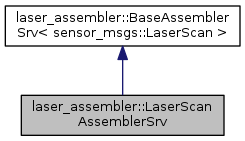Maintains a history of laser scans and generates a point cloud upon request. More...

Public Member Functions | |
| void | ConvertToCloud (const string &fixed_frame_id, const sensor_msgs::LaserScan &scan_in, sensor_msgs::PointCloud &cloud_out) |
| unsigned int | GetPointsInScan (const sensor_msgs::LaserScan &scan) |
| Returns the number of points in the current scan. More... | |
| LaserScanAssemblerSrv () | |
| ~LaserScanAssemblerSrv () | |
 Public Member Functions inherited from laser_assembler::BaseAssemblerSrv< sensor_msgs::LaserScan > Public Member Functions inherited from laser_assembler::BaseAssemblerSrv< sensor_msgs::LaserScan > | |
| BaseAssemblerSrv () | |
| virtual void | ConvertToCloud (const std::string &fixed_frame_id, const sensor_msgs::LaserScan &scan_in, sensor_msgs::PointCloud &cloud_out)=0 |
| Converts the current scan into a cloud in the specified fixed frame. More... | |
| void | start () |
| Tells the assembler to start listening to input data It is possible that a derived class needs to initialize and configure various things before actually beginning to process scans. Calling start create subcribes to the input stream, thus allowing the scanCallback and ConvertToCloud to be called. Start should be called only once. More... | |
| ~BaseAssemblerSrv () | |
Private Attributes | |
| filters::FilterChain< sensor_msgs::LaserScan > | filter_chain_ |
| bool | ignore_laser_skew_ |
| laser_geometry::LaserProjection | projector_ |
| sensor_msgs::LaserScan | scan_filtered_ |
Additional Inherited Members | |
 Protected Attributes inherited from laser_assembler::BaseAssemblerSrv< sensor_msgs::LaserScan > Protected Attributes inherited from laser_assembler::BaseAssemblerSrv< sensor_msgs::LaserScan > | |
| ros::NodeHandle | n_ |
| ros::NodeHandle | private_ns_ |
| tf::TransformListener * | tf_ |
Detailed Description
Maintains a history of laser scans and generates a point cloud upon request.
ROS Parameters
- (Several params are inherited from laser_assembler::BaseAssemblerSrv)
- "~ignore_laser_skew" (bool) - Specifies the method to project laser data
- true -> Account for laser skew, and compute the transform for each laser point (This is currently really slow!)
- false-> Don't account for laser skew, and use 1 transform per scanline. (This might have a little error when moving fast)
ROS Service Calls
- "~build_cloud" - Inhertited from laser_assembler::BaseAssemblerSrv
Definition at line 57 of file laser_scan_assembler_srv.cpp.
Constructor & Destructor Documentation
|
inline |
Definition at line 60 of file laser_scan_assembler_srv.cpp.
|
inline |
Definition at line 69 of file laser_scan_assembler_srv.cpp.
Member Function Documentation
|
inline |
Definition at line 79 of file laser_scan_assembler_srv.cpp.
|
inlinevirtual |
Returns the number of points in the current scan.
- Parameters
-
scan The scan for for which we want to know the number of points
- Returns
- the number of points in scan
Implements laser_assembler::BaseAssemblerSrv< sensor_msgs::LaserScan >.
Definition at line 74 of file laser_scan_assembler_srv.cpp.
Member Data Documentation
|
private |
Definition at line 103 of file laser_scan_assembler_srv.cpp.
|
private |
Definition at line 100 of file laser_scan_assembler_srv.cpp.
|
private |
Definition at line 101 of file laser_scan_assembler_srv.cpp.
|
mutableprivate |
Definition at line 104 of file laser_scan_assembler_srv.cpp.
The documentation for this class was generated from the following file: